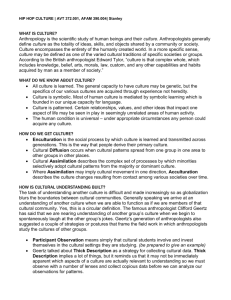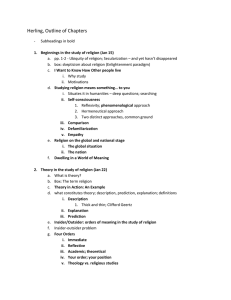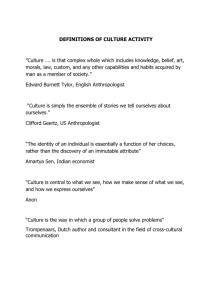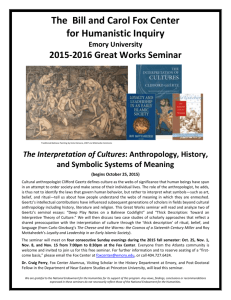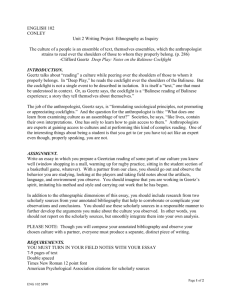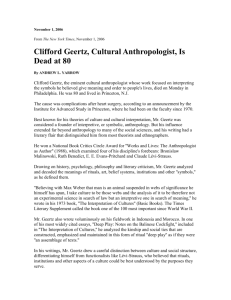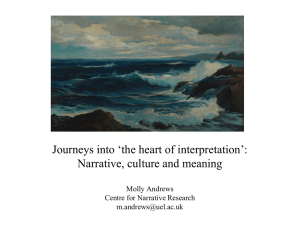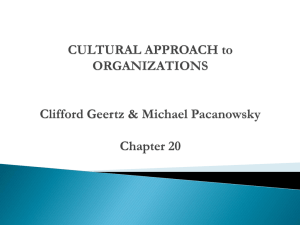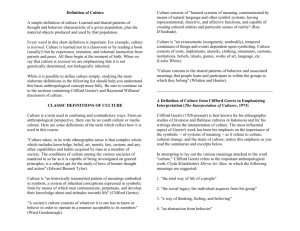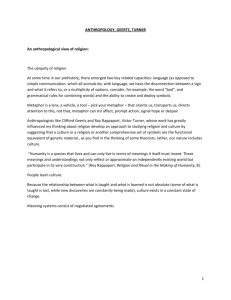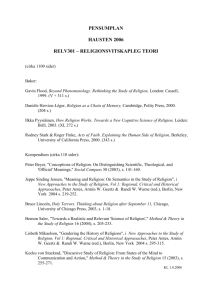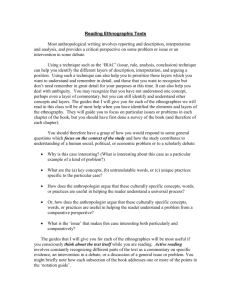Clifford Geertz_The interpretation of cultures
advertisement
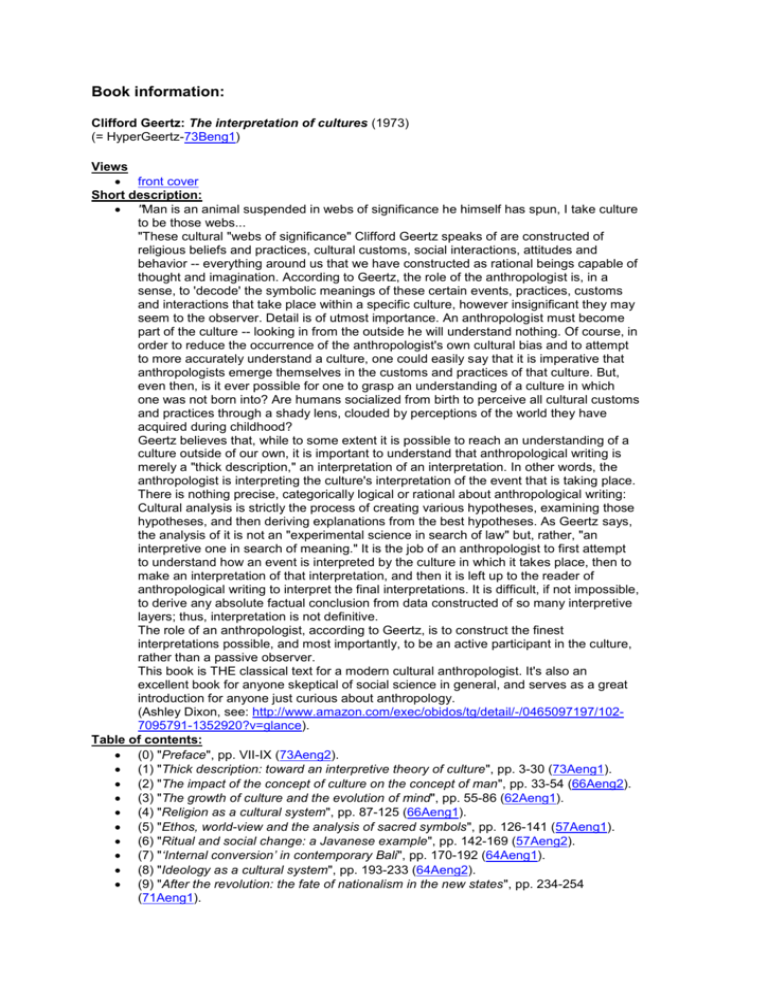
Book information: Clifford Geertz: The interpretation of cultures (1973) (= HyperGeertz-73Beng1) Views front cover Short description: "Man is an animal suspended in webs of significance he himself has spun, I take culture to be those webs... "These cultural "webs of significance" Clifford Geertz speaks of are constructed of religious beliefs and practices, cultural customs, social interactions, attitudes and behavior -- everything around us that we have constructed as rational beings capable of thought and imagination. According to Geertz, the role of the anthropologist is, in a sense, to 'decode' the symbolic meanings of these certain events, practices, customs and interactions that take place within a specific culture, however insignificant they may seem to the observer. Detail is of utmost importance. An anthropologist must become part of the culture -- looking in from the outside he will understand nothing. Of course, in order to reduce the occurrence of the anthropologist's own cultural bias and to attempt to more accurately understand a culture, one could easily say that it is imperative that anthropologists emerge themselves in the customs and practices of that culture. But, even then, is it ever possible for one to grasp an understanding of a culture in which one was not born into? Are humans socialized from birth to perceive all cultural customs and practices through a shady lens, clouded by perceptions of the world they have acquired during childhood? Geertz believes that, while to some extent it is possible to reach an understanding of a culture outside of our own, it is important to understand that anthropological writing is merely a "thick description," an interpretation of an interpretation. In other words, the anthropologist is interpreting the culture's interpretation of the event that is taking place. There is nothing precise, categorically logical or rational about anthropological writing: Cultural analysis is strictly the process of creating various hypotheses, examining those hypotheses, and then deriving explanations from the best hypotheses. As Geertz says, the analysis of it is not an "experimental science in search of law" but, rather, "an interpretive one in search of meaning." It is the job of an anthropologist to first attempt to understand how an event is interpreted by the culture in which it takes place, then to make an interpretation of that interpretation, and then it is left up to the reader of anthropological writing to interpret the final interpretations. It is difficult, if not impossible, to derive any absolute factual conclusion from data constructed of so many interpretive layers; thus, interpretation is not definitive. The role of an anthropologist, according to Geertz, is to construct the finest interpretations possible, and most importantly, to be an active participant in the culture, rather than a passive observer. This book is THE classical text for a modern cultural anthropologist. It's also an excellent book for anyone skeptical of social science in general, and serves as a great introduction for anyone just curious about anthropology. (Ashley Dixon, see: http://www.amazon.com/exec/obidos/tg/detail/-/0465097197/1027095791-1352920?v=glance). Table of contents: (0) "Preface", pp. VII-IX (73Aeng2). (1) "Thick description: toward an interpretive theory of culture", pp. 3-30 (73Aeng1). (2) "The impact of the concept of culture on the concept of man", pp. 33-54 (66Aeng2). (3) "The growth of culture and the evolution of mind", pp. 55-86 (62Aeng1). (4) "Religion as a cultural system", pp. 87-125 (66Aeng1). (5) "Ethos, world-view and the analysis of sacred symbols", pp. 126-141 (57Aeng1). (6) "Ritual and social change: a Javanese example", pp. 142-169 (57Aeng2). (7) "‘Internal conversion’ in contemporary Bali", pp. 170-192 (64Aeng1). (8) "Ideology as a cultural system", pp. 193-233 (64Aeng2). (9) "After the revolution: the fate of nationalism in the new states", pp. 234-254 (71Aeng1). (10) "The integrative revolution: primordial sentiments and civil politics in the new states", pp. 255-310 (63Aeng1). (11) "Politics of meaning", pp. 311-326 (71Aeng2). (12) "Politics past, politics present: some notes on the uses of anthropology in understanding the new states", pp. 327-341 (67Aeng1). (13) "The cerebral savage: on the work of Claude Levi-Strauss", pp. 345-359 (67Aeng2). (14) "Person, time, and conduct in Bali: an essay in cultural analysis", pp. 360-411 (66Beng1). (15) "Deep play: notes on the Balinese cockfight", pp. 412-453 (= enlarged from 1972Aeng1, see the online version). (16) Acknowledgements, Index, pp. 455-470. Reviews: Colson, Elizabeth. Contemporary Sociology, 11/1/75, Vol. 4 Issue 6, p637-638, 2p Dillon, Wilton S.. Teachers College Record, Sep74, Vol. 76 Issue 1, p155-159, 5p (anonymous) Social Forces, Jun74, Vol. 52 Issue 4, p588-588, 1/9p (see the online HyperGeertz-Review) Gauging Geertz's Growth. By: Fenn, Richard. Journal for the Scientific Study of Religion, Jun74, Vol. 13 Issue 2, p248-249, 2p Swidler, Ann, Contemporary Sociology, May 1996, vol. 25, no. 3, pp. 299-302. Edmund R. Leach: Review of Clifford Geertz 'The interpretation of cultures', in: University of Cambridge/UK, Janus library, The Papers of Edmund Ronald Leach, item no. 31 (The file comprises a photocopied typescript review written for 'The Listener', June 1975, but not published in the journal between 1975 - 1976), see the online notice.
